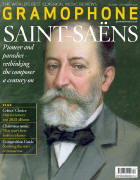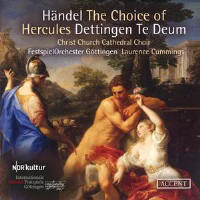Texte paru dans: / Appeared in: |
|
|
Outil de traduction |
|
|
Reviewer: Richard Wigmore
Laurence Cummings and the seasoned Handelians of the Göttingen Festival Orchestra give spirited and sensitive performances of both works. Tempos seem spot on, rhythms exuberant, animated by propulsive bass lines. My only real reservation is that the spirited Christ Church choir, trebles especially, lack the ideal impact the Te Deum needs, partly due to a recording balance that favours the orchestra. In swashbuckling choruses such as the opening ‘We praise thee, O God’ the Christ Church choir sound only mildly jubilant alongside their mixed-voice Cambridge rivals Trinity, in a thrilling performance directed by Stephen Layton. But Cummings and his forces beautifully catch the grave inwardness of the more reflective numbers. Cody Quattlebaum, with his noble, darkly rounded bass, makes his two prayerful solos highlights of the whole performance. The choir are also too backwardly balanced in their few appearances in The Choice of Hercules. And I don’t hear enough of their words. But Cummings has the full measure of this delectable score, while all his soloists are fine Handel stylists. As so often, the devil, alias Pleasure, gets many of the best tunes, including the catchy ‘There the brisk sparkling nectar drain’ and the chic gavotte ‘Turn thee, youth’. Fflur Wyn, bright and youthful of tone, sings these with panache. Rachel Kelly, with a mezzo glint in her soprano, is well contrasted as Virtue. She brings a stern authority to the aria ‘Mount, mount the steep ascent’, after Hercules has made his inevitable choice. Perhaps the plum of the whole score is Hercules’s musing ‘Yet, can I hear that dulcet lay’. Beautifully cushioned by the Göttingen strings, mezzo Diana Moore beguiles with her warm, even tone and tenderly expressive phrasing. In his sole aria tenor Nathan Haller is personable, if not ideally fluent in coloratura. Pushed to choose a version of Handel’s allegorical ode, I’d still go for the Hyperion recording conducted by Robert King, with Susan Gritton, with a hint of smoky sensuality in her tone, and Robin Blaze outstanding among the soloists. King’s choir also has more presence. That said, there is much to savour in these live Göttingen performances of two comparative rarities, expertly performed by musicians who love and understand Handel. |
|




